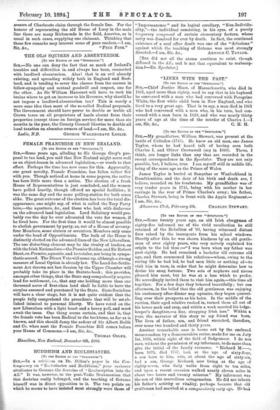FEMALE FRANCHISE IN NEW ZEALAND. go THE EDITOR ON THZ
"SPECTATOR."] SIB,—Some years ago, alluding to Sir George Grey's pro- posal to tax land, you said that New Zealand might serve well as an object-lesson in advanced legislation,—or words to that effect. Perhaps the time has now come for this. Apparently, our great novelty, Female Franchise, has fallen rather flat with you. Though noticed at home in some papers, the notice has been little more than a notice. The election of a fresh House of Representatives is just concluded, and the women have polled heavily, though offered no special facilities ; it was the same day and the same polling-station for both sexes alike. The great outcome of the election has been the total dis- appearance, one might say, of what is called the Tory Party here,—the squatters, &c., and those who look with disfavour on the advanced land legislation. Lord Salisbury would pro. bably rue the day he ever advocated the vote for women, if he lived here. For the first time it would be almost possible to abolish government by party, as, out of a House of seventy- four Members, some sixteen or seventeen Members only come under the head of Oppositionists. The balk of the House is distinctly elected on the advanced lines of the New Liberalism. The one disturbing element may be the rivalry of leaders, as with the Irish Nationalists—the Premier Seddon and Sir Robert Stout, ex-Premier, agnostic, and teetotaler, not being in sympa- thetic accord. The Direct Veto will come up, although a strong measure of Local Option is already law. The Land-for-Settle- ment Act thrown out last Session by the Upper Chamber will probably take its place in the Statute-book ; this provides, amongst other things, that the State may compulsorily acquire land for settlement, i.e., that any one holding more than one thousand acres of first-class land shall be liable to have the surplus assessed and purchased by the State. State Socialism will have a clear stage, but it is not quite evident that the people fully comprehend the precedents that will be estab- lished inimical to personal liberty. We have voted on the new Liberalism with a light heart and a heavy poll, and must await the issue. One thing seems certain, and that is, that the female vote has been Radical to the backbone, as far as is known, and this should damp the ardour of Sir Albert Rollit and Co. when next the Female Franchise Bill comes before your House of Commons.—I am, Sir, &c.,
THOMAS OSLER.
Hamilton, New Zealand, December 6th, 1893.






































 Previous page
Previous page